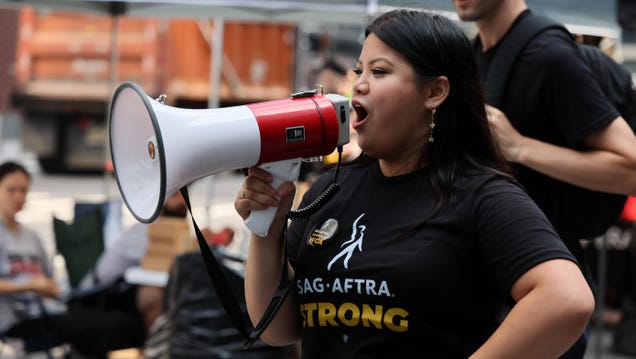As the SAG-AFTRA strike continues, the union has released its list of demands alongside the Alliance of Motion Picture and Television Producers’ responses. A note that AMPTP denies that this is totally accurate, and says that the following document “fails to include the proposals offered verbally” and concessions made on June 12, 2023, hours before the threat of strike became real, but… if even a fraction of the responses to SAG-AFTRA’s demands are true, AMPTP really shouldn’t be congratulated for whatever it said in the 11th hour.
You can read the document in full below, but I want to pull out a couple of notes that are, to put it lightly, egregious overreaches of power on the part of the AMPTP. First is the outright denial of revenue sharing on streaming services, which is consistent across the WGA negotiations as well. Streaming services in general have been hotbeds for contention for a number of reasons: the lack of transparency when it comes to streaming numbers, the extremely low residual payments, and the abbreviated release schedule that makes projects difficult to market.

One of the most hair-raising issues is that SAG-AFTRA wants to increase fines on late payments. The union said that the AMPTP admits that it is often late, but the response is basically telling SAG-AFTRA members to deal with it. SAG-AFTRA also said that the AMPTP failed to address its AI concerns, “leaving principal performers and background actors vulnerable to having most of their work replaced by digital replicas.” This is a concern that many are repeating after SAG-AFTRA’s Duncan Crabtree-Ireland said that the AMPTP wanted to give background actors $100 for a single day’s work and have the rest of their performance digitally added in afterwards.
Additionally, SAG-AFTRA sought many measures that would promote equality and diversity among unit members during production and almost all were rejected. East and West Coast background actors operate under different contracts; SAG-AFTRA sought to unite them under one contract; that was rejected. SAG-AFTRA asked to end pay discrimination—where actors not in LA or NYC are paid less than LA or NYC actors—which was also rejected. Asked to increase accessibility of online auditions and self-tapes, only some measures were approved. Still on the AMPTP’s table are predatory third-party apps, and no page read limit.
With regards to diversity, the document says that AMPTP did not agree to hair and makeup standards that would ensure that all actors of colour, specifically Black actors, would have access to hair and make-up artists that understood their hair textures and skin tones. According to SAG-AFTRA, AMPTP maintained that only principal actors deserve to be treated with this kind of dignity and said that it wouldn’t agree to enforcement. At the very least, SAG-AFTRA states that AMPTP has agreed to stop paint-ups and wigging. (Paint ups are when a stunt actor is “painted” to have their skin tone match the performer they’re stepping in for. Wigging is when a male stunt actor’s gender is masked via wigs and dress to make them appear to be a female actor. This was done despite the fact that there are diverse stunt actors out there who can take on these roles.)
Also, on the punitive side, SAG-AFTRA contents that the AMPTP rejected proposals for increasing penalties if meal breaks didn’t happen, and if rest periods were not given to performers. Which feels like the bare minimum here. Just like, at what point does the AMPTP realize that money and fair pay is important, but treating performers at every level like human beings is also incredibly important?
AMPTP said in a press release that “The deal that SAG-AFTRA walked away from on July 12 is worth more than $1 billion in wage increases, pension, and health contributions and residual increases and includes first-of-their-kind protections over its three-year term, including expressly with respect to AI.”

However, none of these have been made clear. This document from SAG-AFTRA, combined with the negotiations posted on the WGA’s site, show a pattern of refusing to rework the contracts that were created without adequate allowances for the popularity of streaming services, refusing to negotiate on pension and healthcare for the guild members, and a complete lack of interest in regulating AI. For both SAG-AFTRA and WGA, this strike isn’t just about defining the nebulous parts of their contracts, but an attempt to future-proof an industry that seems intent on demeaning and destroying artists and does not support up-and-coming performers and writers. There needs to be a path forward, and if AMPTP is standing in the way, SAG-AFTRA and the WGA are going to march over them anyway.
Read the full SAG-AFTRA Negotiation Document hosted by GMG Editorial.
Want more io9 news? Check out when to expect the latest Marvel, Star Wars, and Star Trek releases, what’s next for the DC Universe on film and TV, and everything you need to know about the future of Doctor Who.
